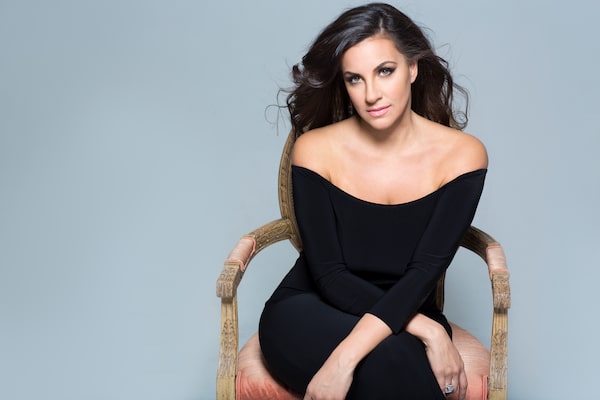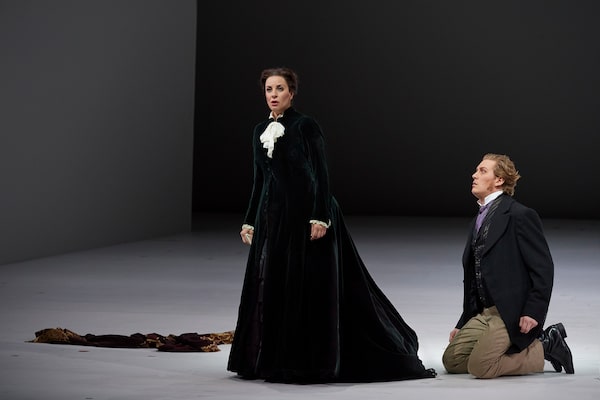
Canadian soprano Joyce El-Khoury praises her Lebanese heritage and self-discipline as among the reasons for her success in opera.
If there’s a part of her Lebanese heritage that soprano Joyce El-Khoury brought to her career as an opera singer, it was her work ethic. “Lebanese people,” she says, “in general are hustlers.” Indeed, most successful opera singers’ careers can be attributed to their discipline and hard work, traits modelled for El-Khoury by her parents as she grew up in Ottawa. “After everything they’ve gone through, my parents are superheroes to me,” she says, looking back with adult hindsight on her family’s immigration from Lebanon to Canada when she was just 6.
Of course, along with a good sense of self-discipline, El-Khoury brought with her to Canada a love of singing. By the time she asked her parents for voice lessons, she was under the Western influence of Whitney Houston and Celine Dion. “That’s what I loved,” she recalls, “even though I did enjoy Lebanese music, I was a Canadian kid.”
There are perhaps few things as Western as opera; El-Khoury is now known for Italian bel canto roles such as Violetta Valéry in Verdi’s La traviata, which places her right in the stylistic core of the art form. It’s not likely she would have found the same exposure to opera in Lebanon, where she admits, “it’s not really part of the culture.”
That’s something El-Khoury has been pondering while here in Toronto. Between rehearsals for the Canadian Opera Company’s production of Tchaikovsky’s Eugene Onegin (which opened on Sept. 30 and goes until Nov. 3), in which she sings the role of Tatyana, she is also preparing for her Nov. 1 recital at the Arab World Festival in Montreal. There, she’ll sing music that fuses opera and Middle Eastern music, including the Canadian premiere of a piece by Lebanese composer Bechara El-Khoury (no relation).
“It’s very hard to find,” she says of her continuing search for music that merges the singing styles of Western and Arabic classical music, and is written by composers who understand both. Left with a dearth of options, “I’ve been thinking about commissioning some pieces.”
El-Khoury is part of the growing number of influential figures in the opera world who are pushing the genre outside of its boundaries, geographical or otherwise. Often clutched at like a set of pearls, opera’s Western traditions have borne its masterpieces, including Eugene Onegin and La traviata, but they have also held opera firmly within the realm of perceived elitism – a place for old, white men if there ever was one.

Joyce El-Khoury as Tatyana and Gordon Bintner as Eugene Onegin in the Canadian Opera Company’s new production of Eugene Onegin, 2018.Michael Cooper coopershoots.com/COC
Historically, opera that celebrates cultures east of Italy has been met with apprehension. Even more fascinating, it has come with conditions: as in, the “exotic” heroine must die. Actually, that applies whether or not the heroine is “exotic.” To be an operatic soprano of El-Khoury’s ilk is synonymous with dying onstage, including the leading ladies in La traviata, La bohème and Tosca. And El-Khoury, in her search for music that connects East and West, isn’t looking for a new Madama Butterfly or Pearl Fishers. “It’s always interesting to explore culture in opera,” she says. “The more we use these creative brushes to paint stories through these alternate lenses, the more possibilities there are for engaging storytelling – especially in a cultural mosaic like Canada.”
El-Khoury’s biculturalism in Ottawa, where she balanced a Lebanese home life and a Canadian experience at school, is a story that rings true not just for the 22 per cent of Canadians who are foreign-born, but also for the nearly 18 per cent who have at least one parent born abroad. Hers is a story of a contemporary Canadian, a fitting mirror for the modernism she brings to opera.
The soprano finds little tension between her career and heritage. When she pursued opera, her parents never asked her, “Why don’t you sing Lebanese music?” She has fond memories of her life in Lebanon, and she makes a point of including singing engagements in her native country in her calendar. “I also feel a great responsibility to my family and community to introduce them to opera and Western classical music, because this isn’t necessarily a genre that they would have been easily exposed to. So, I invite them to performances whenever I can.”
She also has a real adoration for the roles she sings, be they doomed heroines or not. She has infectious enthusiasm for parsing an operatic score; she loves to find where she differs from a character, and what they may have in common. In the case of Tchaikovsky’s Tatyana, El-Khoury connects with her humble Act I life, which precedes her Act III rise to aristocracy. “I relate to that in many ways, because that’s how I see myself,” she says. “Just little me, from Lebanon.”
El-Khoury immigrated to Canada, learned English, and flourished professionally. She found a love for, and success in, opera – an art form of Western culture far removed from her Lebanese heritage. And instead of exchanging one culture for another, she takes steps to integrate them with the medium she has at her disposal – a medium that comes ironically from neither Lebanon nor Canada.
In an old-world, vaguely colonial way, hers is perhaps what we would call a modern cultural assimilation. A family history of immigration has become more common than not, at least in the West, and El-Khoury’s biculturalism, paired with her international career, makes her the modern face not just of an opera singer, but of a Canadian.
Asked whether opera comes with geographical limits, El-Khoury is adamant that “music belongs to everybody.” Her hunt for music that merges cultures may be modern, but it’s not a new idea; rather, pluralism is inherent in opera. “When we talk about opera, we talk about the marriage of art forms,” she says. “So, why not?”